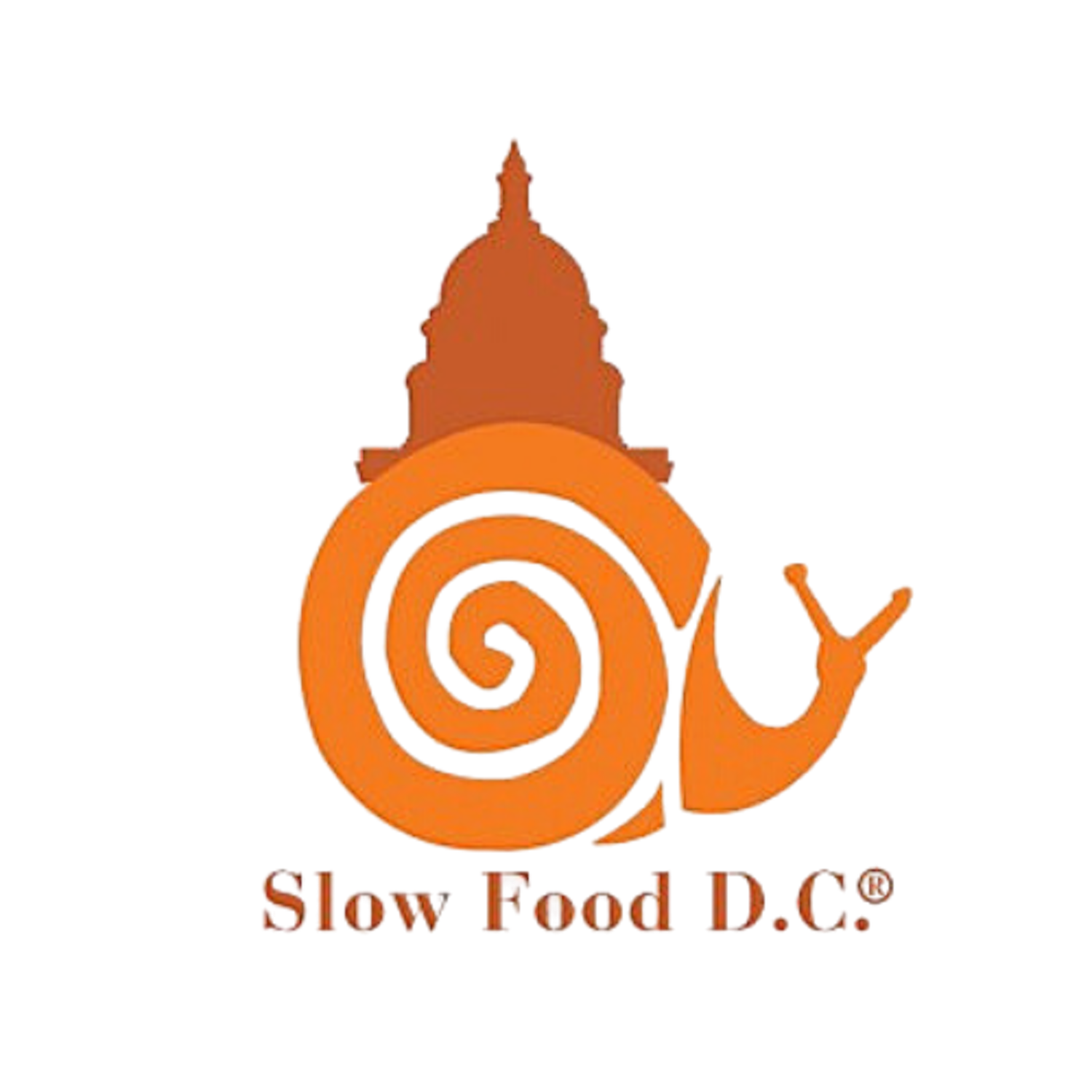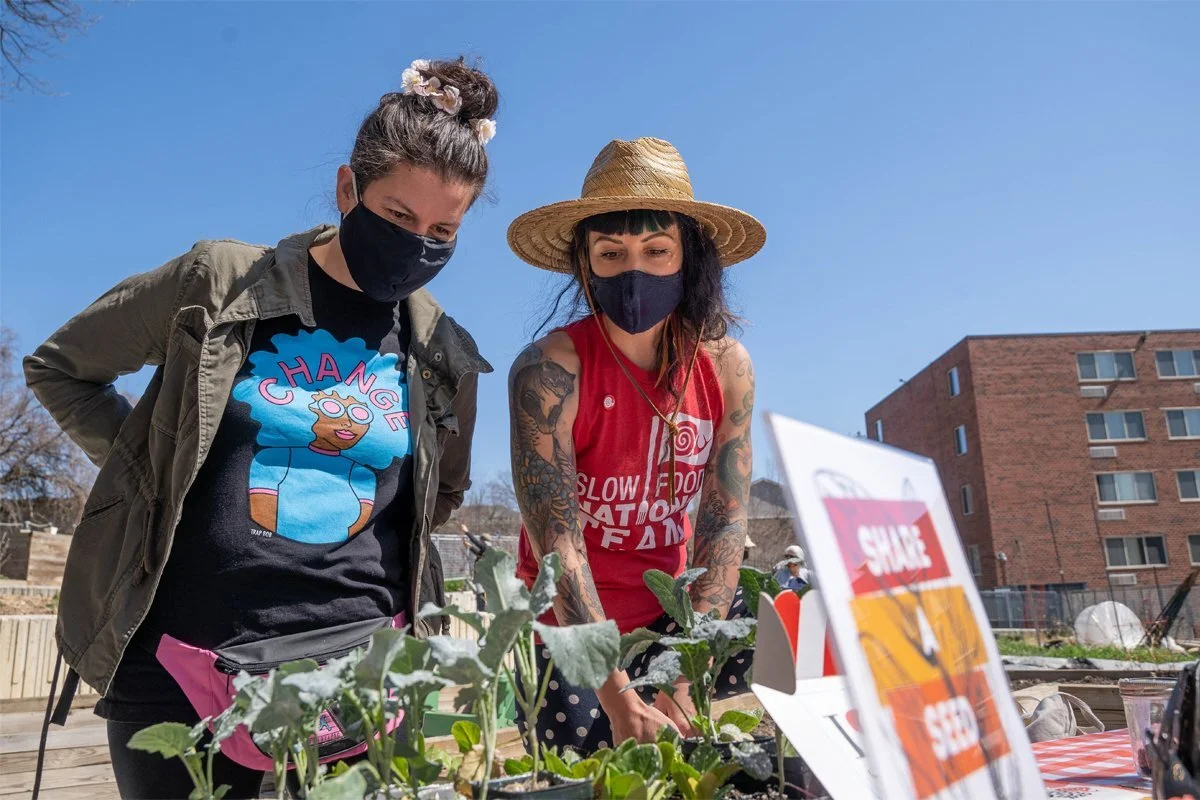Share a Seed Program Garners National Attention
The surge of interest in gardening sparked by the pandemic in 2020 shows no signs of slowing down. Continued demand for seeds and other gardening supplies has led to shortages, leaving many communities without the resources to build community, enhance food sovereignty, and restore relationships to food and land.
To fill the gap, Slow Food DC is participating in the first-ever Share a Seed program, conceived and spearheaded by board member Reana Kovalcik. Surplus seeds, and limited gardening supplies, can be mailed or dropped off at one of several participating locations. You can find out more about Share a Seed here.
We’re thrilled that Civil Eats choose to highlight this effort to build community through gardening, along with several others throughout the country. Find an excerpt of the Civil Eats article below.
Share a Seed Founder Reana Kovalcik (right) chats with Erin Palmer, ANC 4B02 Commissioner. (Photo credit: Hannah Packman, Slow Food DC)
These Garden Mentors Are Growing Equity
Master gardeners are helping fight food insecurity by supporting home gardening to build healthier communities.
BY LISA HELD - JUNE 11, 2021
Shifting Seed Resources
Reana Kovalcik got the idea for Share a Seed, now a program of Slow Food USA, after working with mutual aid organizations during the pandemic and realizing that scarce seeds and gardening supplies would put low-income folks at the end of the line.
“The supply chains have reopened, but for many people, that changes nothing about their ability to garden or have access to these resources,” said Kovalcik, a communications professional who has worked for various food and farming nonprofits. “I thought, ‘How can I create abundance in this time of scarcity?’ Both in terms of material and community, because at the same time that people weren’t able to find materials or seeds, they were also experiencing a scarcity of human connection.”
Washtingon, D.C. Councilmember Janeese Lewis George attends a Share a Seed event at Upshur Community Garden, Ward 4. (Photo credit: Hannah Packman, Slow Food DC)
Since then, Kovalcik has carried her seed catalog, packets, and gardening supplies all over Washington, D.C. Slow Food USA launched the program in five cities this March, including Washington, D.C., Las Vegas, Denver, Dallas, and Springfield, Illinois. Kovalcik says the program is modeled on seed sharing, not swapping, which implies that an exchange must take place. On the other hand, she says, “‘share’ means we could exchange, but if you have a surplus, you can create abundance for someone else.”
Those looking to donate extra seeds can mail them to one of the participating Slow Food chapters. Local leaders then distribute them to people who need them while also providing mentorship in gardening. In D.C., Kovalcik sets up tables at farmers’ markets, community gardens, and breweries, where people can come talk to her about how to grow and take seeds and supplies home with them. Many approach her with the idea that they’d love to grow things but don’t have the space in the city, and she helps walk them through their options given the constraints.
Kovalcik is also coordinating with groups that are already connected to urban communities that could benefit from gardening resources. For instance, Plantita Power is an organization centered on the healing power of gardening for queer, BIPOC people. “I raided my entire seed catalog and gave them all the healing herbs that we have,” Kovalcik said. “I pulled out every holy basil and chamomile [seed] and put together a big package.”
She’s also working with Kyanite Pantry, a mobile community food pantry started by plant-based chef Kya Parker initially to feed protesters in the wake of the uprisings after the murder of George Floyd. “Kya has been bringing seeds and gardening equipment to her weekly distributions out in the community. Just like you can get a hot meal, you also get a bag of soil and you have seeds,” she said. Kovalcik has also been able to pass on pots and seedlings to Parker to be distributed.
Overall, Kovalcik‘s goal with Share A Seed is to redistribute existing resources rather than diverting new resources away from other food insecurity efforts. Like Kleinman, she’s not sure if the group will operate long after we move past COVID-19, but she hopes pieces of the program have inspired other shifts, such as more seeds or plants included as elements of mutual aid organizing. When she created 100 planting kits using donated seeds from Pennsylvania-based Earth Spring Farm to be distributed through the D.C. Public Library and they “went like hotcakes,” she started working on a more permanent relationship with the library.
During such a difficult year, Kovalcik said that the impact the program has had on people’s spirits is clear. “The amount of joy that it has created, it’s been overwhelming,” she said. “The goal of this project is not to solve world hunger; it’s to reconnect people with the land and with one another.”
—————————————————
You can read the Civil Eats article in its entirety here.

